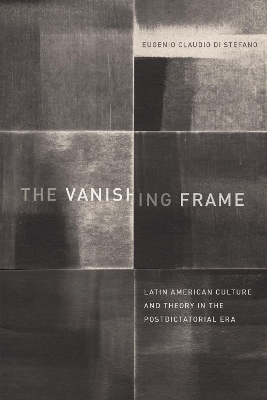
The Vanishing Frame
Latin American Culture and Theory in the Postdictatorial Era
Seiten
2018
University of Texas Press (Verlag)
978-1-4773-1618-4 (ISBN)
University of Texas Press (Verlag)
978-1-4773-1618-4 (ISBN)
Examining the works of writers and artists such as Roberto Bolaño, Fernando Botero, Pablo Larraín, and Alejandro Zambra, this pathfinding book challenges postdictatorial aesthetics by focusing on the concept of aesthetic autonomy as a critique of economic inequality.
In the postdictatorial era, Latin American cultural production and criticism have been defined by a series of assumptions about politics and art—especially the claim that political freedom can be achieved by promoting a more direct experience between the textual subject (often a victim) and the reader by eliminating the division between art and life. The Vanishing Frame argues against this conception of freedom, demonstrating how it is based on a politics of human rights complicit with economic injustices. Presenting a provocative counternarrative, Eugenio Claudio Di Stefano examines literary, visual, and interdisciplinary artists who insist on the autonomy of the work of art in order to think beyond the politics of human rights and neoliberalism in Latin American theory and culture.
Di Stefano demonstrates that while artists such as Diamela Eltit, Ariel Dorfman, and Albertina Carri develop a concept of justice premised on recognizing victims’ experiences of torture or disappearance, they also ignore the injustice of economic inequality and exploitation. By examining how artists such as Roberto Bolaño, Alejandro Zambra, and Fernando Botero not only reject an aesthetics of experience (and the politics it entails) but also insist on the work of art as a point of departure for an anticapitalist politics, this new reading of Latin American cultural production offers an alternative understanding of recent developments in Latin American aesthetics and politics that puts art at its center and the postdictatorship at its end.
In the postdictatorial era, Latin American cultural production and criticism have been defined by a series of assumptions about politics and art—especially the claim that political freedom can be achieved by promoting a more direct experience between the textual subject (often a victim) and the reader by eliminating the division between art and life. The Vanishing Frame argues against this conception of freedom, demonstrating how it is based on a politics of human rights complicit with economic injustices. Presenting a provocative counternarrative, Eugenio Claudio Di Stefano examines literary, visual, and interdisciplinary artists who insist on the autonomy of the work of art in order to think beyond the politics of human rights and neoliberalism in Latin American theory and culture.
Di Stefano demonstrates that while artists such as Diamela Eltit, Ariel Dorfman, and Albertina Carri develop a concept of justice premised on recognizing victims’ experiences of torture or disappearance, they also ignore the injustice of economic inequality and exploitation. By examining how artists such as Roberto Bolaño, Alejandro Zambra, and Fernando Botero not only reject an aesthetics of experience (and the politics it entails) but also insist on the work of art as a point of departure for an anticapitalist politics, this new reading of Latin American cultural production offers an alternative understanding of recent developments in Latin American aesthetics and politics that puts art at its center and the postdictatorship at its end.
Eugenio Claudio Di Stefano is an associate professor of Spanish at the University of Nebraska at Omaha.
Acknowledgments
Introduction: Freedom at the End of the Postdictatorial Era
Part 1. Postdictatorial Aesthetics
Chapter 1. From Revolution to Human Rights
Chapter 2. Disability and Redemocratization
Chapter 3. Making Neoliberal History
Part 2. Toward a Politics of the Frame
Chapter 4. The Reappearance of the Frame
Chapter 5. Anti-intentionalism and the Neoliberal Left
Chapter 6. Literary Form Now
Coda: The Victim, the Frame
Notes
Works Cited
Index
| Erscheinungsdatum | 02.08.2018 |
|---|---|
| Reihe/Serie | Border Hispanisms |
| Verlagsort | Austin, TX |
| Sprache | englisch |
| Maße | 152 x 229 mm |
| Gewicht | 426 g |
| Themenwelt | Geisteswissenschaften ► Sprach- / Literaturwissenschaft ► Anglistik / Amerikanistik |
| Geisteswissenschaften ► Sprach- / Literaturwissenschaft ► Literaturwissenschaft | |
| Geisteswissenschaften ► Sprach- / Literaturwissenschaft ► Romanistik | |
| ISBN-10 | 1-4773-1618-3 / 1477316183 |
| ISBN-13 | 978-1-4773-1618-4 / 9781477316184 |
| Zustand | Neuware |
| Haben Sie eine Frage zum Produkt? |
Mehr entdecken
aus dem Bereich
aus dem Bereich
Poetik eines sozialen Urteils
Buch | Hardcover (2023)
De Gruyter (Verlag)
CHF 83,90
Buch | Softcover (2024)
belleville (Verlag)
CHF 27,95


